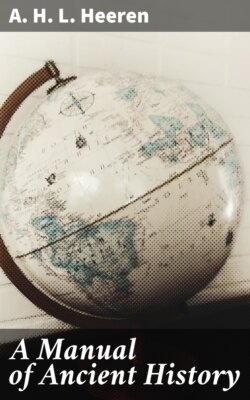Читать книгу A Manual of Ancient History - A. H. L. Heeren - Страница 12
На сайте Литреса книга снята с продажи.
General Preliminary Observations upon the History and Constitution of the great Asiatic Empires.
ОглавлениеTable of Contents
Magnitude of the empires in Asia.
1. Asia contained in ancient times, as it does at present, empires of immense extent, differing materially both in this respect and in their constitution from the civilized nations of Europe. Changes were frequent; but the form of government continued nearly always the same. Some deeply rooted and active principles therefore must have been in constant operation, to have given so repeatedly, in these various revolutions, the same organization to the kingdoms of Asia.
Nature of their revolutions.
2. The great revolutions of Asia, with the exception of that caused by Alexander, were effected by the numerous and powerful nomad races which inhabited a large portion of that continent. Pressed by necessity or circumstances, they forsook their own seats, founded new kingdoms, and carried war and conquest into the fruitful and cultivated lands of southern Asia, until, enervated by luxury, the consequence of the change in their mode of life, they were in their turn, and in a similar manner, subjugated.
Their short existence.
3. This origin, common to all Asiatic kingdoms, accounts for their immense extent, their rapid establishment, and their generally brief duration.
Similarity in their constitutions.
4. The internal organization must, for the same reasons, have been nearly alike in all; and the constant reappearance of despotism is accounted for, partly by the rights of conquest, partly by the vast extent of the subdued countries, which obliged the rulers to have recourse to satrap-government.
Effects of polygamy.
5. To this, it must moreover be added, that among all the considerable nations of inner Asia, the paternal government of every household was corrupted by polygamy: where that custom exists, a good political constitution is impossible; fathers being converted into domestic despots, are ready to pay the same abject obedience to their sovereign that they exact from their family and dependants in their domestic economy.
To avoid confusion, it will be necessary to define the terms despotism and despotic government. In theory, we must admit THREE essentially different kinds of government. 1st. The despotic, in which the members of the state are not secured in the possession of their rights as men, (personal freedom and security of property,) nor of their rights as citizens, (active participation in the legislative power). Such a constitution exists only by force, and can never be lawful. 2nd. The autocratic, in which the members of the state are in full possession of their rights as men, but not of their rights as citizens. This government, therefore, arises from the union of the legislative and executive powers in the person of the ruler. In form, it is either monarchical or aristocratical (a pure monarchy, or a pure aristocracy). This kind of government is most likely to be established by usurpation; it may, nevertheless, be acquired by succession, or even adopted by common consent: it may therefore be lawful. 3rd. The republican, in which the members of the state are in possession of their rights, both as men and as citizens. This government necessarily presupposes a separation of the legislative and executive powers; and with regard to its form, may be either monarchical or aristocratical, (a moderate monarchy, or a moderate aristocracy).—How far can a pure democracy be called a government, and comprised under any of the foregoing heads?—Explanation of the despotism in the Asiatic kingdoms, and the attempts made to limit it by religion and religious institutions.
Rise, progress, and fall of nomad empires.
6. General features in the gradual internal development of all empires formed by nomad conquerors. (a) At first the mere occupation of rich territories, and levying of tribute. (b) Hence the constitutions already established among the conquered or tributary nations generally suffered to remain. (c) Gradual progress towards the adoption of a fixed abode and the building of cities, together with the assumption of the customs and civilization of the conquered. (d) Division into provinces, and, as a necessary consequence, the establishment of satrap-government. (e) Insurrections of the satraps, and the internal ruin of the state prepared thereby. (f) The influence of the seraglio on the government has the same effect, for its unavoidable consequences are—effeminacy and indolence in the rulers. (g) Hence the dissolution of the empire, or its total annihilation by some violent attack from without.
